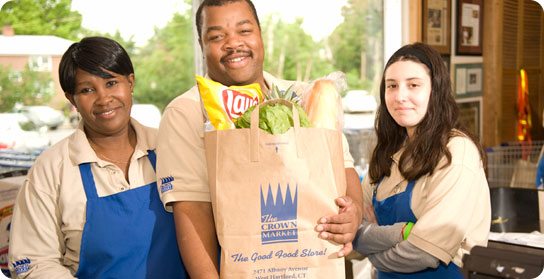The greater Hartford Jewish community, whose epicenter is West Hartford, was rocked this week by news that the Crown Market is closing. For 74 years, the Crown has been not just the place where you could buy kosher but the community’s heart and soul. As one local blogger put it:
I see people on my Facebook feed reminiscing about Crown’s seven-layer cake and world-famous tuna. We are so tied to food, and Crown Market has fed Hartford-area simchas (celebrations) and shivas for generations. We are profoundly saddened that we failed to shepherd it to the next generation.
“Nooooooooooooo!” lamented non-Jewish Hartford media celeb Colin McEnroe, who proceeded to gin up support for turning the store into a co-op.
The Crown is closing because its business has declined, for which there are several explanations. In recent years, it has been crowded by the cheaper and sexier food (including kosher meat) purveyed by nearby Big Y, Whole Foods, and Walmart Neighborhood Market stores. Meanwhile, the Jews have been moving out of its immediate environs, from what’s known as “the Reservation” (with street names like Mohegan, Mohawk, and Iroquois) to Farmington and Simsbury and Glastonbury.
It’s claimed as well that there has been a decline in the number of Hartford Jews who keep kosher, though I’d like to see the numbers on that. What I suspect is that in the old days, a lot of Jews who didn’t do so nevertheless shopped at the Crown out of tribal loyalty, and the knowledge that this was where you’d run into your neighbors.
At issue here is a broad decline in community involvement, be it membership in synagogue, golf club, or JCC. Nor is this only the consequence of dispersion and secularization. Among those who have not been shopping at the Crown are the local ultra-Orthodox — in particular, the members of Chabad, who claimed that the Crown’s food was not kosher enough for them. While the store’s performance in that regard once left something to be desired, since 2010 its meat has been certified glatt kosher by a local Orthodox (but not Chabad) rabbi.
“Chabad would do the community a favor if they’d stop seeing themselves as elitist,” said one community leader. “Their mistake is that their own viability is compromised.” Compromised, that is, by a decline in contributions from community leaders who can’t forgive them for refusing to patronize the Crown.
But Chabad’s stance in Hartford is characteristic of the ultra-Orthodox generally. One of the most striking findings of last Fall’s Pew study of American Jews is the transformation of the most religious portion of the country’s Jewish population from largely Modern Orthodox to heavily Ultra-Orthodox. Whereas the Modern Orthodox — those who combine traditional observance with full engagement in American society — are the portion of the Jewish population most engaged in communal activities outside their synagogues, the Ultras are the least.
It’s the decline of the Modern Orthodox, one might say, that removed the jewels from the Crown.






